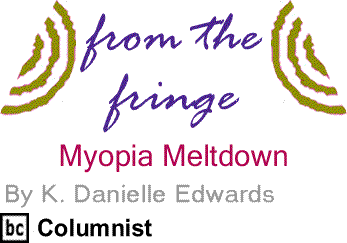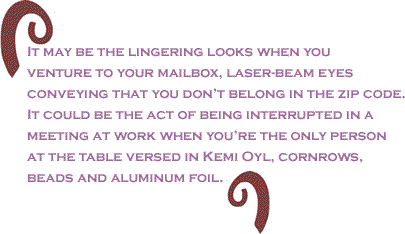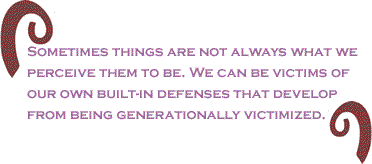
|
|||||||||||||||||||||||

|
|

Custom Search
|
|
 |
|
Sometimes something happens and we are forced to confront our own presumptions, preconceived notions and faulty premises. In the corporate workplace and in a relatively homogenous social construct that often does not reflect the heterogeneity of its true broader, community composition, these moments may be few and far between. That’s because our judgments, knee-jerk reactions and visceral responses, held in check by a desire not to rock the boat too much or come off conspiratorial or crazy, often prove valid. They are planted and cultivated by years of disappointments and deferred dreams. They are tended to in our darkest hours and interrupt our brightest moments. They are the subtleties that, for us, don’t go unnoticed – the sideways glances, offhand remarks and general cluelessness that impinge on our humanity and nip at our fortitude. It may be the lingering looks when you venture to your mailbox, laser-beam eyes conveying that you don’t belong in the zip code. It could be the act of being interrupted in a meeting at work when you’re the only person at the table versed in Kemi Oyl, cornrows, beads and aluminum foil. Or perhaps it’s a moment when you must fight, tooth and nail, bone to muscle, brain and emotional brawn, to get the credit, the pittance, which should not be in question that you have rightfully earned. We are instructed not to cast our pearls before swine. Yet we make lemonade out of lemons everyday. This should not be the inheritance of black life in America, but it is the conditioning, tilled and harvested over and over, season after season, that becomes our bounty, while someone else typically gets the booty.
However, sometimes something subtle yet seismic happens. As a black woman in the corporate workplace, the idea of such a confrontation that doesn’t confirm my suspicions, but instead begs me to reevaluate my own issues, is rare. But a recent occurrence brought me to pause, rocking the foundations of my long-held feelings about race and sex in this environment dressed in the artifice of jargon and codes and networks and visibility. I am accustomed to being the only, among the few, the first or the novelty. From childhood to present day, I have frequently been the lone black face, the sole black body, in a sea of majority presence. Such exposure has afforded me the flexibility to be comfortable among people of all types and stripes; while I may notice that I am the only one in a room, in a meeting or at the table, that recognition has become expected and not exceptional. As a black woman with shoulder-length dreadlocks in the Bible Belt, I don’t bleed into the background. I have been called a strategic nonconformist who bucks convention but does so in a way that inspires curiosity rather than outright fear. Still, I have attracted stares and glares. I have been the recipient of terse responses to genuine attempts at conversation. I have noticed eyes averted, hands fidgety and nervous cracks in voices when faced with my presence. I have been indoctrinated into assuming the worst. I am fluent in the looks and language of prejudice, discomfort, xenophobia and under-exposure. As much as I may try not to, my color can indeed color my interpretation of events, human relations and even the most seemingly innocuous interactions and exchanges. But sometimes you have to check yourself – as much as you analyze and check others. One day, a power broker who looked the usual part . . . someone who consistently averted his eyes . . . who sometimes did not speak when spoken to . . . who looked down at the floor in the elevator rather than yield to the natural impulse to establish eye contact . . . who sped away when I was within a 20-foot radius . . . who I thought might be a closet case of hatred and animosity . . . broke down and put it to me quite simply. “You are beautiful. That’s what I think every time I see you. Absolutely stunning and gorgeous.” I gulped and delivered a response mined from my mental deck of talking points.
Sometimes things are not always what we perceive them to be. We can be victims of our own built-in defenses that develop from being generationally victimized. And while others may use their position and power to make statements from a privileged comfort zone, we cannot always project our own preconceptions onto others. This exchange taught me that sometimes we are forced to drop our security blankets, remove our blinders and momentarily turn off the voices in our head to see situations for what they are. Lesson learned. BlackCommentator.com
Columnist, K. Danielle
Edwards, a Nashville-based writer, poet and communications professional,
seeks to make the world a better place, one decision and one action
at a time. To her, parenting is a protest against the odds, and
marriage is a living mantra for forward movement. Her work has appeared
in Blue Jean Magazine, Mother Verse Literary Journal,
Mamazine.com, Mamaphonic.com, Parenting Express, The Black World
Today, Africana.com, The
Black World Today, The Tennessean and other publications.
Work from Edwards is forthcoming in Black Magnolias Literary
Journal. She is the author of Stacey Jones: Memoirs of Girl & Woman, Body & Spirit,
Life & Death |
|
Any BlackCommentator.com article may be re-printed so long as it is re-printed in its entirety and full credit given to the author and www.BlackCommentator.com. If the re-print is on the Internet we additionally request a link back to the original piece on our Website. Your comments are always welcome. eMail re-print notice
If you send us an eMail message we may publish all or part of it, unless you tell us it is not for publication. You may also request that we withhold your name. Thank you very much for your readership. |
|
| |
|
| April 30 , 2009 Issue 322 |
|
| Executive Editor: Bill Fletcher, Jr. |
| Managing Editor: Nancy Littlefield |
| Publisher: Peter Gamble |
| Est. April 5, 2002 |
Printer Friendly Version
in resizeable plain
text format or pdf
format. |
| Frequently Asked Questions |
 |

|
 |
 |
 |
| |
| |




































